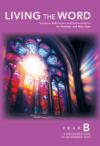Scripture Study for
Fourth Sunday of Lent
Joshua 5:9a, 10–12 / Psalm 34:9a / 2 Corinthians 5:17–21 / Luke 15:1–3, 11–32
<< Back to LECTIONARY RESOURCES
Understanding the Word
By Br. John R. Barker, OFM
The story of the promises to the ancestors continues with the triumphant entry into the land promised to them and their descendants. Moses has died (Deuteronomy 34:5); his successor Joshua now leads Israel. His first act in the land (which they reached by crossing the Jordan “on dry ground,” reenacting the deliverance at the Red Sea [4:4–24]) is to celebrate the Passover, which commemorates God’s redemption of Israel. The Lord had been sustaining Israel in the wilderness with manna; God now sustains them with the produce of the land. God’s providential care for Israel takes different forms, but it remains nonetheless the hallmark of God’s relationship with the children of Abraham, Isaac, and Jacob.
Paul has been exhorting the Corinthians to remember that they have received an imperishable gift by dying with Christ (and being raised again in baptism). Those who now live in Christ live not for themselves but for Christ (5:14–15). This new life is a full transformation, not just a continuation of their previous life, a transformation that begins with reconciliation with God. This has many implications, including the obligation to share this gift with others. To live for Christ means, among other things, to be his ambassador, announcing on his behalf the gift of reconciliation and inviting others to be reconciled to God in Christ. Those who are now in Christ will want what he does, beginning with new life for all by being reconciled with God.
The Pharisees and scribes have assumed, observing Jesus “welcoming” sinners and eating with them, that he condones their sins. Rather than disabuse them of this notion directly, he challenges them to look at things from God’s perspective. Even a human father is capable of grieving over an ungrateful and dissolute son who runs off and comes crawling back in fear and shame. Rather than stand imperiously waiting for the son to reach him with his rehearsed apologies, the father runs to meet him, overjoyed that he has returned. The Pharisees and scribes seem to assume a God who waits for sinners to come crawling back to him, perfect and perfectly contrite, rather than running out to greet them “while they are still a long way off.” Jesus welcomes sinners, we are meant to understand, because this is how God is.
